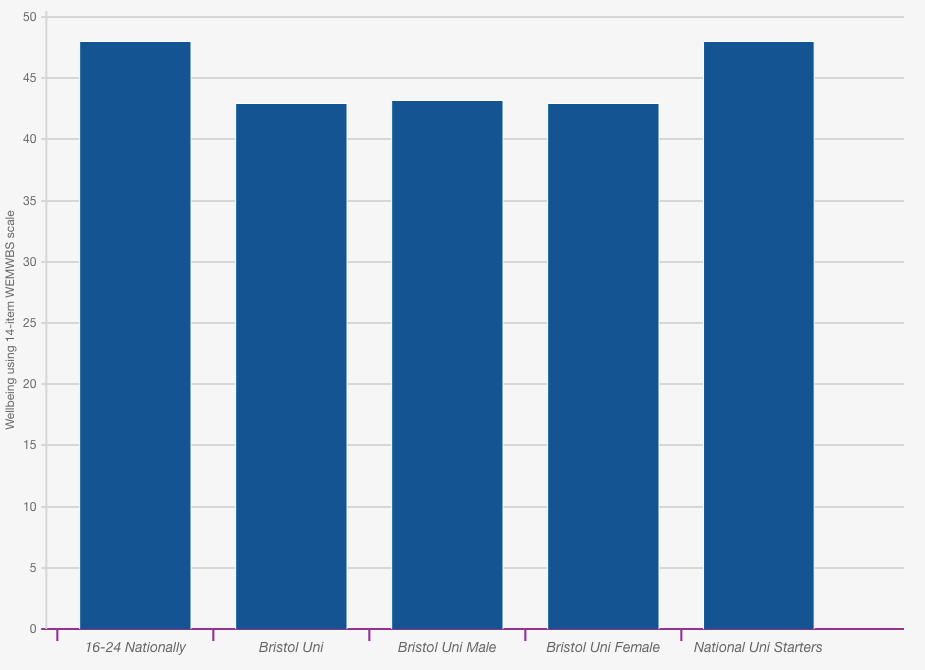By Maddy Russell, News Editor
Authors of the 2019 Wellbeing Report described the findings as an ‘troublingly high’.
The University of Bristol's annual Wellbeing Report for 2019 has found that 45 per cent of Bristol students screened positive for ‘moderate’ to ‘severe’ symptoms of depression.
The report analyses the results of an online questionnaire, which was open to all undergraduate and postgraduate students between May 6th and 27th 2019.
The questionnaire, which used the widely recognised Warwick and Edinburgh Mental Wellbeing Scale (WEMWBS) to test for symptoms of depression and anxiety amongst students, found that nine out of every 20 students who undertook the test demonstrated signs of depression. Comparatively, the global student average for symptoms of depression is believed to be around 21 per cent (approximately 1 in 5).
Whilst the average WEMWBS score for UK 16-24 year olds is between 48 to 50. The average score for Bristol students was 43. According to the WEMWBS scale a higher overall score suggests better mental health.

The overall number of students demonstrating symptoms of depression were found not to have changed from the findings from the University's first Wellbeing Report in 2018, which also found that 45 per cent of students at the University reported ‘moderate’ to ‘severe’ depressive symptoms.
The report also uncovered that 35 per cent of Bristol students experienced ‘moderate’ to ‘severe’ levels of anxiety. This figure has fallen by 2 per cent since 2018, but is still higher than the global student average, which is 18 per cent.
Students identified as being from a minority background were found to be more likely to experience symptoms of depression and anxiety.
Female students were also found to be seven per cent more likely to suffer from depression and 10 per cent more likely to suffer from anxiety, than their male counterparts.
Analysis of findings from a recent Freedom of Information request sent to all 163 UK universities by the BBC, suggests that the number of students seeking support for mental health problems has risen by 53 per cent within the last five years.
Whilst the overall number of students displaying symptoms of depression remained the same as in 2018, students’ overall attitudes towards the University’s wellbeing services were found to have improved.
The report found that perception of the availability of wellbeing services and their accessibility had gone up since 2018. With 48 per cent of students in the 2019 report claiming to have found time with a Student Wellbeing advisor ‘extremely useful’ compared to only 39 per cent in 2018.
Similarly, the number of those claiming that the University Wellbeing services were ‘not useful’ fell by 10 per cent.
In a statement in response to these findings in the report, a spokesperson for the University said: 'We recognise that nationally more young people are reporting difficulties with their mental health.
'At Bristol we have reviewed everything we do and introduced a whole-institution approach to mental health and wellbeing with substantially strengthened support for our students in their accommodation, in academic schools and through central support services.
'This has enabled us to provide more proactive support for student wellbeing, both for our students during their transition into University and to help create a sense of community and wellbeing during their time with us. Our enhanced teams are also able to provide direct support for students whenever they need it, 24/7, throughout the year.
'Like all universities, schools and colleges, we are deeply concerned by the increase of mental health issues amongst our young people nationally.
'We continue to challenge ourselves to improve our academic processes and student support on an ongoing basis and feedback from students is an essential part of this. The steps we are taking are part of a journey that will evolve over time. Much has already changed in the past few years, but new activities and initiatives will emerge as we learn from our work here at Bristol, and as all parts of society understand more about these complex challenges.'
The full Wellbeing Report for 2019 can be found here.
Featured Image:Twitter/@BristolUni
Students who may be experiencing depression or other problems with their mental health are encouraged to get in contact with the support services bellow
Young Minds https://youngminds.org.uk/ 0808 802 5544
Nightline https://www.nightline.ac.uk/want-to-talk/
Papyrus https://www.papyrus-uk.org/ 0800 068 41 41
Student Minds http://www.studentminds.org.uk/findsupport.html






